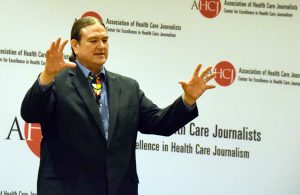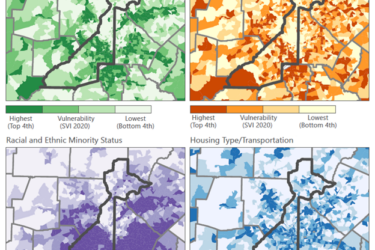
More than 700 people attended Health Journalism 2018, the 20th anniversary celebration of the Association of Health Care Journalists.
Reporters, editors, producers, health policy experts, doctors and educators gathered in the scenic Phoenix desert to discuss emerging science, new trends in business, health information technology and more.
The conference kicked off with an engrossing and sometimes startling presentation about health in the Native American population.
Donald Warne, M.D., M.P.H., chair of the Department of Public Health in the College of Health Professions at North Dakota State University and the senior policy adviser to the Great Plains Tribal Chairmen’s Health Board, described Third World health conditions on the country’s reservations. While poverty, inequality and lack of access to education and health care contribute to the problem, he pointed out that historical trauma in that population is an important component.
The Association recognized the winners of the 2017 Awards for Excellence in Health Care Journalism at a luncheon before hearing from 2015 award winner John Carreyrou. His reporting for The Wall Street Journal broke open the story of Theranos, a Silicon Valley startup whose founder claimed to be transforming medicine with her blood-testing company.
Carreyrou, whose book, “Bad Blood: Secrets and Lies in a Silicon Valley Startup,” will be published May 21, discussed how he came across the story and his efforts to investigate the company and its founder, Elizabeth Holmes. Carreyrou’s reporting drew litigation threats from Theranos and visits from its outside counsel. Today, the company has laid off most of its workers and Holmes has given up control of the company and has been forbidden by the SEC to be a director or officer of a publicly traded company for 10 years.
Carreyrou told the compelling story of a patient who was put through a battery of tests after receiving alarming blood test results. Her story illustrated the “emotional and financial toll of a health care scare brought on by inaccurate results,” Carreyrou said.
 Some attendees took part in field trips that included stops at the Muhammad Ali Parkinson Center, Barrow Neurological Institute, Circle the City (a nonprofit community health organization), Mayo Clinic-Phoenix, Banner–University Medical Center Phoenix and the University of Arizona College of Medicine–Phoenix. One field trip featured the chance to watch brain surgery live with the opportunity to ask the surgeon questions. During the other field trip, attendees watched – and photographed – a simulated birth using robotic dummies.
Some attendees took part in field trips that included stops at the Muhammad Ali Parkinson Center, Barrow Neurological Institute, Circle the City (a nonprofit community health organization), Mayo Clinic-Phoenix, Banner–University Medical Center Phoenix and the University of Arizona College of Medicine–Phoenix. One field trip featured the chance to watch brain surgery live with the opportunity to ask the surgeon questions. During the other field trip, attendees watched – and photographed – a simulated birth using robotic dummies.
Among the dozens of panels, a session about housing and health illuminated the link between homelessness and early death as well as the risks of communicable diseases, assault and stress. “Colds develop into bronchitis and pneumonia more frequently than in the general population and we see a lot of GI issues and of course dental (problems),” said Brandi Whisler, director of outpatient services at Phoenix-based Circle the City – a nonprofit organization that provides health care to the homeless.
Another timely panel discussed antibiotic resistance, painting a chilling picture of the development of superbugs and the lack of development of new antibiotics. “If you think about this as a race between bugs and drugs, the 30-year gap [since a new class of antibiotics was discovered] means the bugs are pulling ahead,” said Elizabeth Jungman, director of The Pew Charitable Trusts’ public health programs.
Other panels looked at the emerging research on cancer and Alzheimer’s disease. A group of experts discussed integrating oral health with overall health care. In a panel about medical devices, experts warned that it’s only a matter of time before a patient is harmed through medical device hacking, and journalists have many resources to probe whether their local health providers are able to prevent or respond to such an event.
Freelancers took advantage of panels on being an entrepreneur, with strategies for running a business, as well as how to best use social media to both promote their work and find sources and story ideas.
A series of workshops included a session on overcoming roadblocks in their reporting with strategies from veteran Washington, D.C., reporters. A “science basics” track helped reporters get up to speed on the evidence-based science of stem cells, genetic testing and marijuana. Freelancers got tips from editors on how to pitch stories, followed up by a real-time critique in which editors discussed what they liked — or didn’t — about selected pitches.
At the annual Freelance PitchFest, often described as “speed dating for journalists,” 23 editors from variety of publications met with about 70 writers seeking new outlets for their work.








